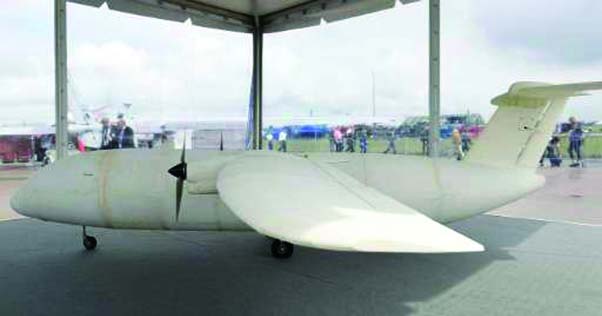
AFP, Eden Prairie :
New 3D printing technology unveiled this week sharply increases the size of objects that can be produced, offering new possibilities to remake manufacturing in the auto, aerospace and other major industries.
One application demonstrated by 3D printing machinery maker Stratasys would allow airlines to pick made-to-order airplane interiors that could be tweaked with the click of a mouse.
By turning the manufacturing plane vertical from the standard horizontal, the “printer” has the potential to create components of unlimited size.
“We’re now talking about parts in feet and meters versus centimeters and inches,” said Rich Garrity, Americas president for Stratasys. “It’s not just a concept.”
The advances, by Stratasys, Siemens and others, are beginning to push 3D printing well into the center of manufacturing from around the edges.
3D printing employs sophisticated computer simulations and software to direct “print” objects from powdered, molten and filament materials like nylon, resins, clays, thermoplastics and metals.
The technology has not always lived up to sky-high hype, but leading manufacturers remain bullish over its potential to shake up the factory floor.
“It is something that is going to be a game-changer,” said Teresa Finchamp, director of operations and quality in Boeing’s department for new technologies.
Benefits include the ability to reduce weight by substituting plastic compounds for metals. And by making use of a “digital toolbox” and made-to-order technology, it can also can reduce the need for warehouse space and many conventional manufacturing tools.
The ultimate prize is finished items equal in quality to today’s goods, but which are cheaper and faster to make.
Siemens argues that 3D printing, along with an increased role of robotics, greater automation and other innovations are creating a “digital factory” that will force a day of reckoning among manufacturers.
“These technologies all evolve so fast,” said Andreas Saar, a vice president for additive manufacturing at Siemens.
“We believe if people don’t connect, they’re going to have a huge problem,” he told AFP.
Boeing, Siemens and Ford are all corporate partners of Stratasys that joined a press tour of its factory in Eden Prairie near Minneapolis.
Stratasys on Wednesday showcased an “infinite build” printer that turns the
plane of production on its side, allowing the printing of items of “practically unlimited part size,” according to the company.
Also on display was a 3D robotic demonstrator utilizing Siemens software that positions and rotates an item as it is printed.
New 3D printing technology unveiled this week sharply increases the size of objects that can be produced, offering new possibilities to remake manufacturing in the auto, aerospace and other major industries.
One application demonstrated by 3D printing machinery maker Stratasys would allow airlines to pick made-to-order airplane interiors that could be tweaked with the click of a mouse.
By turning the manufacturing plane vertical from the standard horizontal, the “printer” has the potential to create components of unlimited size.
“We’re now talking about parts in feet and meters versus centimeters and inches,” said Rich Garrity, Americas president for Stratasys. “It’s not just a concept.”
The advances, by Stratasys, Siemens and others, are beginning to push 3D printing well into the center of manufacturing from around the edges.
3D printing employs sophisticated computer simulations and software to direct “print” objects from powdered, molten and filament materials like nylon, resins, clays, thermoplastics and metals.
The technology has not always lived up to sky-high hype, but leading manufacturers remain bullish over its potential to shake up the factory floor.
“It is something that is going to be a game-changer,” said Teresa Finchamp, director of operations and quality in Boeing’s department for new technologies.
Benefits include the ability to reduce weight by substituting plastic compounds for metals. And by making use of a “digital toolbox” and made-to-order technology, it can also can reduce the need for warehouse space and many conventional manufacturing tools.
The ultimate prize is finished items equal in quality to today’s goods, but which are cheaper and faster to make.
Siemens argues that 3D printing, along with an increased role of robotics, greater automation and other innovations are creating a “digital factory” that will force a day of reckoning among manufacturers.
“These technologies all evolve so fast,” said Andreas Saar, a vice president for additive manufacturing at Siemens.
“We believe if people don’t connect, they’re going to have a huge problem,” he told AFP.
Boeing, Siemens and Ford are all corporate partners of Stratasys that joined a press tour of its factory in Eden Prairie near Minneapolis.
Stratasys on Wednesday showcased an “infinite build” printer that turns the
plane of production on its side, allowing the printing of items of “practically unlimited part size,” according to the company.
Also on display was a 3D robotic demonstrator utilizing Siemens software that positions and rotates an item as it is printed.

